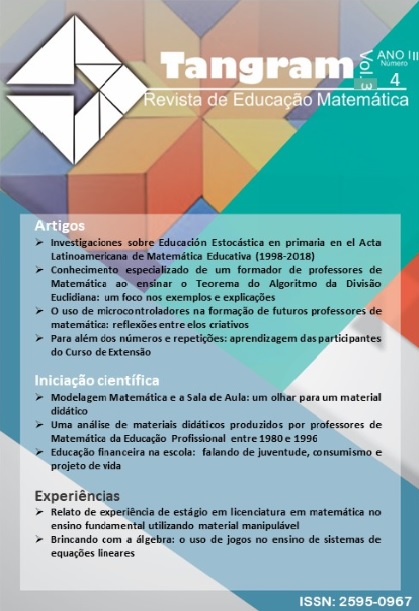Research on Stochastic Education in Elementary School in the Acta Latinoamericana de Matemática Educacional (1998-2018)
DOI:
https://doi.org/10.30612/tangram.v3i4.10925Keywords:
Stochastic Education. Primary Education. Scientific production.Abstract
This work presents the preliminary results of a bibliometric study, at a descriptive level, in which the articles published in the Acta Latinoamericana de Matemática Educativa on statistics and/or probability in Primary Education, between 1998 and 2018. To this end, the studies on Stochastic Education at the elementary level are identified, considering the following units of analysis: theme treated, production per year, authors (quantity, sex, institution and country of origin), keywords and citations from Google Scholar. The study reveals the scarce amount of work about this theme and its discontinuity in this period.Downloads
References
Batanero, C. (2000). ¿Hacia dónde va la educación estadística? Blaix, 15, 2-13.
Bendels, M. H., Dietz, M. C., Brüggmann, D., Oremek, G. M., Schöffel, N. y Groneberg, D. A. (2018). Gender disparities in high-quality dermatology research: a descriptive bibliometric study on scientific authorships. BMJ Open, 8(4), e020089.
Bracho-López, R., Maz-Machado, A., Torralbo-Rodríguez, M., Jiménez-Fanjul, N., Adamuz-Povedano, N. y Gutiérrez-Arenas, M. P. (2012). La investigación en Educación Matemática a través de las publicaciones científicas españolas. Revista Española de Documentación Científica, 35(2),262-280
Cañizares, M. J., Estepa, A. y Batanero, C. (2000). Perspectiva de la investigación del grupo de trabajo didáctica de la probabilidad, estadística y combinatoria. En N. Climent, L. Contreras y J. Carrillo (Eds.), Cuarto Simposio de la Sociedad Española de Investigación en Educación Matemática (pp. 165-174). Huelva: SEIEM.
Carballo, M. T. y Ojeda, A. M. (2009). Estocásticos en el segundo ciclo de la Educación Primaria: determinismo y azar. En P. Lestón (Ed.), Acta Latinoamericana de Matemática Educativa 22 (pp. 67-76). México: CLAME A. C.
CLAME (2019). Convocatoria y Lineamientos para la presentación de artículos para la Revista Acta Latinoamericana de Matemática Educativa-ALME. Recuperado de: https://alme.org.mx/alme33/
Godino, J. D., Carrillo, J., Castro, W. F., Lacasta, E., Muñoz-Catalán, M. C. y Wilhelmi, M. R. (2011). Métodos de investigación en educación matemática. Análisis de los trabajos publicados en los simposios de la SEIEM (1997-2010). En M. Marín, G. Fernández, L. J. Blanco y M. Palarea (Eds.), Investigación en Educación Matemática XV (pp. 33-50). Ciudad Real: SEIEM.
Hulme, E. W. (1923). Statistical bibliography in relation to the growth of modern civilization. London: Butler & Tanner Grafton & Co.
Inzunsa, S y Jiménez, J. (2013). Caracterización del razonamiento estadístico de estudiantes universitarios acerca de las pruebas de hipótesis. Revista Latinoamericana de Investigación en Matemática Educativa, 16(2), 179-211.
López-Mojica, J. M., Ojeda, A. M. y Cantoral, R. (2009). Estocásticos en el segundo grado de Educación Especial. En P. Lestón (Ed.), Acta Latinoamericana de Matemática Educativa 22 (pp. 5-13). México: CLAME A. C.
Ortiz, J. J. (2010). La educación estadística en los simposios de la SEIEM (1997-2009). En M. M. Moreno, A. Estrada, J. Carrillo y T. A. Sierra (Eds.), Investigación en Educación Matemática XIV (pp. 475-486). Lleida: SEIEM.
Özkaya, A. (2018). Bibliometric Analysis of the Studies in the Field of Mathematics Education. Educational Research and Reviews, 13(22), 723-734.
Pérez, O. y Cantoral, R. (2018). Editorial. Transformación, 14(2), 148-149.
Pérez, O., García, O. y Triana-Hernández, B. M. (2017). Profesionalización de la comunidad latinoamericana de matemática educativa. Paradigma, 38(2), 346-365.
Pritchard, A. (1969). Statistical bibliography or bibliometrics. Journal of documentation, 25(4), 348-349.
Solano-López, E., Castellanos-Quintero, S., López Rodríguez del Rey, M. y Hernández-Fernández, J. (2009). La bibliometría: una herramienta eficaz para evaluar la actividad científica postgraduada. MediSur, 7(4), 59-62.
Steen, L. (Ed.) (2001). Mathematics and democracy: the case for qauantitative literacy. Princeton, NJ: National Council on Education and the Disciplines.
Thompson, D. F. y Walker, C. K. (2015). A descriptive and historical review of bibliometrics with applications to medical sciences. Pharmacotherapy: The Journal of Human Pharmacology and Drug Therapy, 35(6), 551-559.
Torres-Alfonso, A. M., Peralta-González, M. J., y Toscano-Menocal, A. (2014). Impacto y productividad de las publicaciones latinoamericanas sobre Matemática Educativa. Biblios, 55, 13-26.
Vázquez, O. (2005). Enseñanza y comprensión del enfoque clásico de la probabilidad en primer grado de secundaria. En J. Lezama, M. Sánchez y J. G. Molina (Eds.), Acta Latinoamericana de Matemática Educativa 18 (pp. 223-229). México: CLAME A. C.
Downloads
Published
How to Cite
Issue
Section
License
Authors must accept the publication rules when submitting the journal, as well as agree to the following terms:
(a) The Editorial Board reserves the right to make changes to the Portuguese language in the originals to maintain the cultured standard of the language, while respecting the style of the authors.
(b) Authors retain the copyright and grant the journal the right to first publication, with the work simultaneously licensed under the Attribution-NonCommercial-ShareAlike 3.0 Brazil (CC BY-NC-SA 3.0 BR) that allows: Share - copy and redistribute the material in any medium or format and Adapt - remix, transform, and create from the material. CC BY-NC-SA 3.0 BR considers the following terms:
- Attribution - You must give the appropriate credit, provide a link to the license and indicate whether changes have been made. You must do so under any reasonable circumstances, but in no way that would suggest that the licensor supports you or your use.
- NonCommercial - You may not use the material for commercial purposes.
- Sharing - If you remix, transform, or create from material, you must distribute your contributions under the same license as the original.
- No additional restrictions - You may not apply legal terms or technological measures that legally restrict others from doing anything that the license permits.
(c) After publication, authors are allowed and encouraged to publish and distribute their work online - in institutional repositories, personal page, social network or other scientific dissemination sites, as long as the publication is not for commercial purposes.






